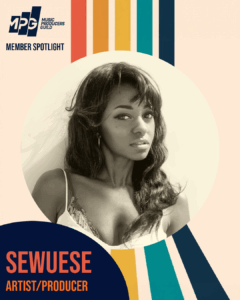 How would you define your main role on most of the projects you work on at the moment?
How would you define your main role on most of the projects you work on at the moment?
‘Artist/Producer’ is the simplest way to describe what I do now, as a solo artist; It’s less of a
mouthful than ‘singer-songwriter/producer’, but it’s always felt quite natural for me to produce my
songs at the same time as writing and recording them.
Creatively speaking, I’m basically a steward of the vision I’m working on. It can be like filling the
colours of a spectrum, or breathing the right energy into the music, to help it come to life the way it
was intended. I hope to bring that to every project of my own, or for others.
Please tell us a bit about your musical background. How did you get started in the music
industry? What was your pathway to your current role?
Quincy Jones, Whitney Houston and Paul Williams were among my earliest influences.
As a pre-teen, I would obsessively listen to RnB, hip hop and pop instrumentals. Inspired at age
twelve, I asked my babysitter how I could become a record producer; She told me we were actually
on our way to a recording studio, where I could ask her producer pals, which I did. There was a big
desk, and all the kit. I made my first beat that same day.
I became a studio regular, doing tape-op and admin jobs, just for a chance to sit in on sessions.
Because I could already sing by then, different musicians would ask me to demo their songs.
Soon after that I got a job in shoe shop to fund school and my own mini recording set up at home
(including a little Akai S20 Sampler which I still have somewhere). I then also funded myself
through college, studying Music Tech and Sound Engineering, and worked as a sound dep in a
major West End theatre show on Drury Lane.
Along the way I met music people, recorded and toured unpaid for friends and emerging artists, so
word of mouth grew. I eventually quit my job in a venue to pursue music full time. Within a year I
was back at the same venue, performing my first proper paid job at The Brit Awards. It felt like a full
circle moment.
I’ve since worked with artists like Usher, Bryan Ferry, Lisa Stansfield, Westlife, David Arnold, Eska,
and arranged/recording for TV and film, while quietly producing my solo music.
What or who inspired you to follow this path?
Because I was painfully shy growing up, and my self-expression was heavily challenged at home, I
had the vocals, but no true ‘voice’ if you know what I mean. That’s probably why I’ve always felt
called to create music. I felt spurred on by a need to express myself more freely, honestly and
safely, and making music offered me that chance.
As they say, music is a universal language, that can connect and uplift all kinds of people, which is
a powerful thing. When I realised I could express myself through just sound without the words, it
was game over! The radio, film and TV music I’d found fun and familiar seeped into my process.
Are there any highlights from your work that you are particularly proud of?
Serenading Usher to tears was a touching surprise! That’s definitely up there on my list of
highlights. Another which I find quite funny is my first time ever playing live keyboards, which was
in Bryan Ferry’s band on stage at Newcastle Arena… no pressure!
Production-wise, my single ‘Lemonade’ is a big one. Turning ‘lemons-to-lemonade’ isn’t a new
concept, but for me, it’s taken me a great deal to pursue music at all. Even the song’s production is
a reminder of that journey, so releasing it felt like literal lemonade, and a personal triumph.
Possibly my favourite though…I love that an American primary school teacher requested to teach
my song ‘Representing You’ to her class of young students. According to her, it’s a song she felt
they should know. Of all the possible highlights, that’s a hard one to beat.
What’s one tip you can share with other MPG members that could help their workflow?
Wherever possible, I find structuring my creative time and workspace so helpful. Time-frames can
free you up to indulge more deeply in the creative process. With workspace, it helps to organise
gain-staging templates, file systems, notes, cue sheets and any other info/housekeeping
surrounding the music as early as possible.
This can be tricky and quite boring stuff for more creative minds like mine, and I’m constantly
looking for ways to make it easier! But I think it can allow for more creative flexibility, and saves
time and stress in the long-run.
What’s one tip you would like an MPG member to share with you?
Insights from other artist/producers with a similar backgrounds would be cool. They may have had
to navigate their careers largely through personal challenges, or just find practical ways to navigate
all the moving parts beyond creativity. Things like like upgrade and popular culture, trends vs
tradition, budgeting etc… that stuff always helps with clarity and setting priorities.
Do you have any words of wisdom for people wanting to get into a similar music production
role to yours?
My few nuggets of advice would be to build on what you have. It’s okay to ask questions. Integrity
is key – when it all comes down to it, we’re all people first, so be good to yourself and others. The
industry can be tricky, but I personally have a higher faith, which has been pivotal for me. We listen
all day…to sounds, to lyrics, and to our peers, but if it ever gets too noisy, try to take time just to listen to yourself.
Read more MPG Full Member Spotlight interviews